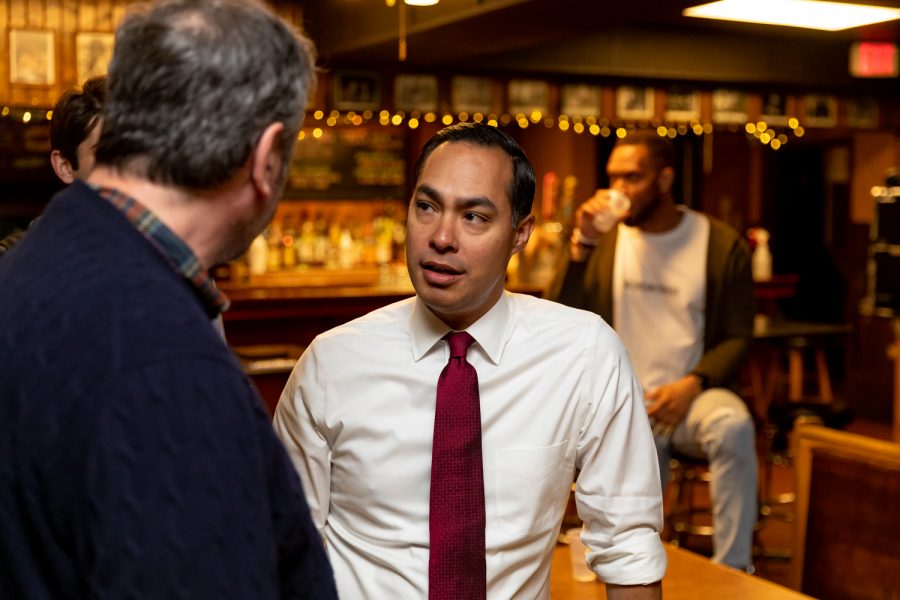Helton: 20 Out of 20: What’s the path forward for Julián Castro?
The former HUD secretary and San Antonio mayor is trying to become the first Latinx president, but his candidacy has yet to have taken off.
Julian Castro, former Secretary of Housing and Urban Development and current Democratic candidate for president takes questions from an attendee at The Mill before appearing on the Political Party Live podcast on Sunday, Apr. 14, 2019.
June 19, 2019
A young star in the Democratic Party, a member of an oppressed minority, and a successful mayor — no, I’m not talking about Pete Buttigieg. Julián Castro is running for president.
Castro served as the secretary of Housing and Urban Development under President Obama and as mayor of San Antonio before that. He’s young and charismatic, and he belongs to the second largest racial group in the country. He’d be the first Latinx nominee for a major party, let alone the first Latinx president. But Castro’s bid for the White House has barely gone anywhere, usually polling at 1 percent or less. Why is that, and what would it take for Castro to build some momentum as the Democratic primary campaign begins in earnest? Let’s take a look.
How could Castro win the Democratic nomination?
Castro’s path to the top of the ticket seems pretty narrow. His aforementioned polls put him in the sea of other random politicians looking for attention. Personally, I’m surprised that a bright young man like Castro hasn’t been able to distinguish himself from the likes of Rep. Eric Swalwell, D-Calif., or Sen. Michael Bennet, D-Colo.
But there’s still more than seven months until Iowa’s first-in-the-nation caucuses. As with rapid rise of Buttigieg and Castro’s fellow Texan, Beto O’Rourke before him, there will surely be other breakout candidates between now and Feb. 3, 2020.
Other pundits have offered what I’ll call the Obama Theory to explain Castro uninflated campaign. In 2008, early primary polling had then-Sen. Hillary Clinton winning the black vote over Obama. According to the Obama Theory, after his underdog victory here in Iowa, the idea of the first black president became more legitimate in the eyes of voters, especially African Americans. Perhaps a similar arc is possible for Castro.
Castro could have a shining moment or two during the first round of primary debates next week, which would be the quickest out of 1 percent polling purgatory. He might be able to create enough support to sustain his campaign until his home state of Texas, where he could cash in on his newly legitimized support.
How could Castro beat Donald Trump?
There might be no more appropriate Democrat to counter President Trump on a personal level than Castro. The often-repeated line from then-candidate Trump’s announcement speech, “[Mexicans] are bringing drugs, they’re bringing crime, they’re rapists” is sure to get another run through the news cycle. If the Castro is leading the charge to unseat the president, he’ll have plenty of authority to speak against incumbent’s racist rhetoric.
Of course, Castro is much more than his race. His youthful smile and hopeful messaging would draw a clear stylistic distinction from Trump’s senior scowl and doomsday diatribes. Offering a positive platform that includes support for such Democratic mainstays as health care, working families, and education — Castro’s big proposal is universal public preschool — seems like a safe strategy to take back the White House.
The eternal Democratic dream of turning Texas blue will inevitably be included in the media discussion. Whether or not the Lone Star State is on the table with Castro is debatable, but other gains are possible. Even if he only gets a minor boost in states with high Hispanic populations such as Nevada, Arizona, Florida, that should be enough to win those electoral votes.
If I had to guess, I’d say Castro’s campaign will get its moment in the spotlight sooner or later. Whether he can take advantage of the moment when the time comes, only time will tell.



